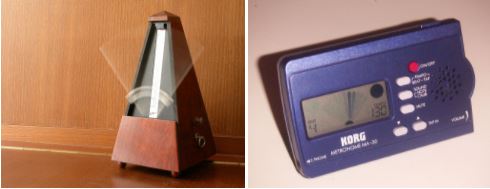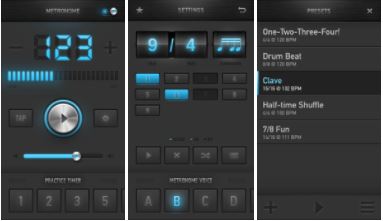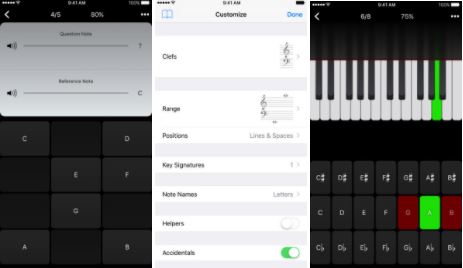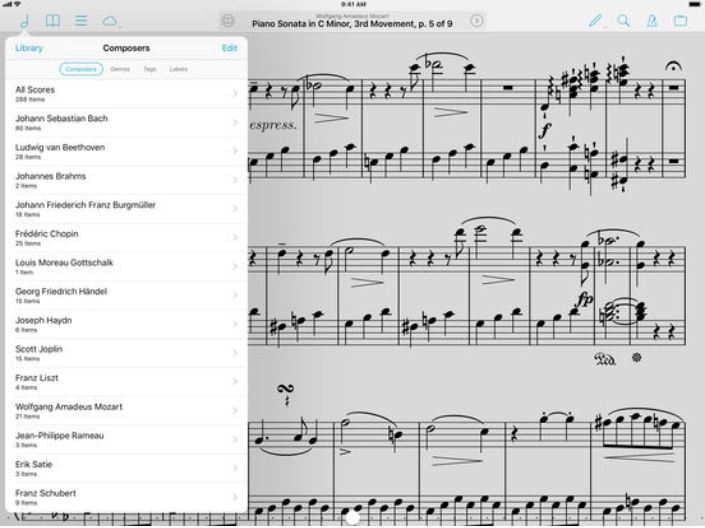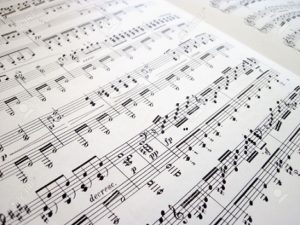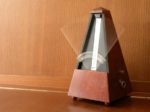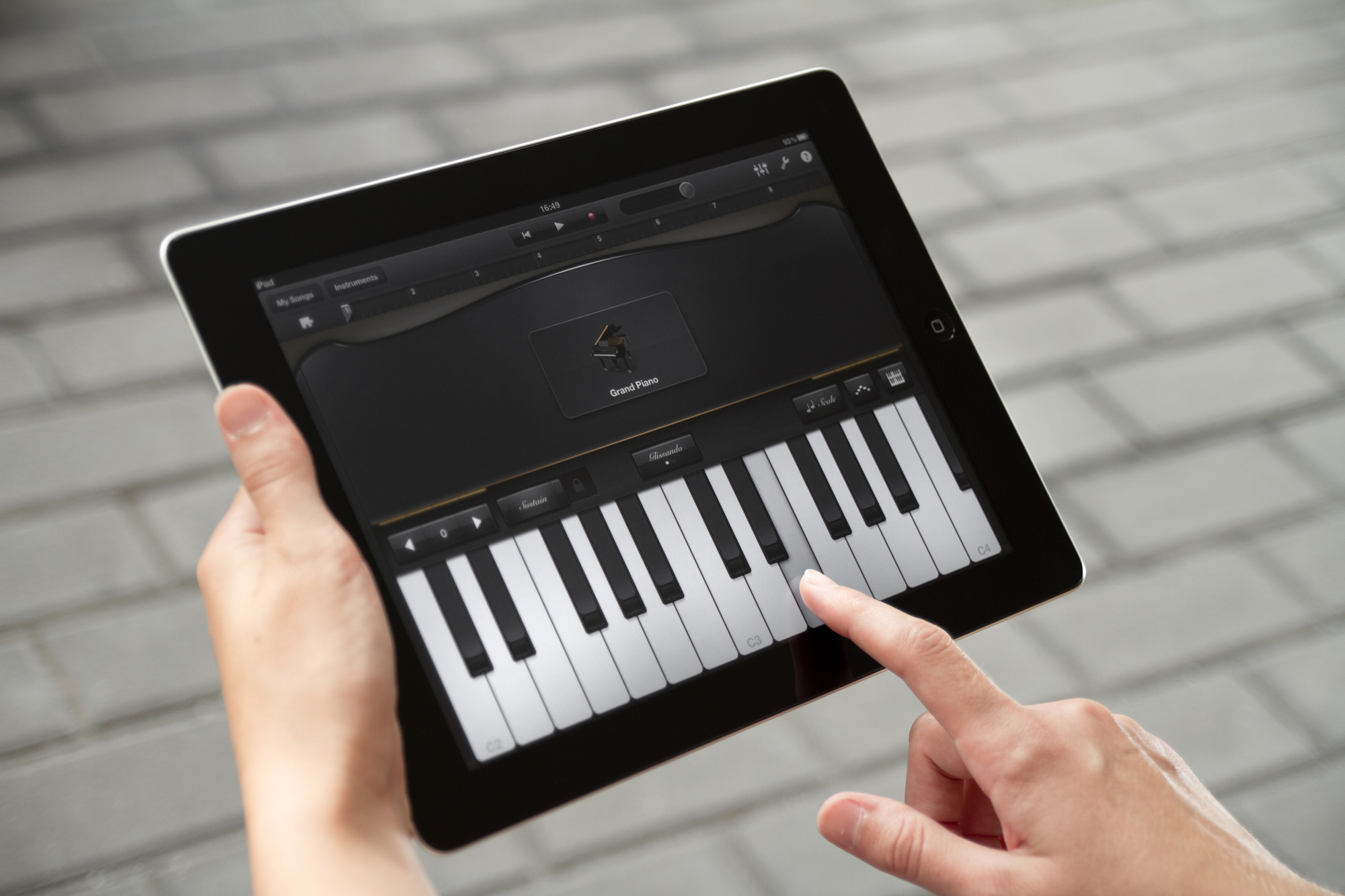
Schumpeter’s, an Austrian-born American economist and political scientist, theory of creative destruction suggests that new technology continuously replaces old technology. Smartphone apps are a prime example of this, replacing many commonplace items we have used to make our lives more convenient. While in the past, we might have had to carry around a pocket bus schedule , we now can access bus information on apps. Likewise, the humble alarm clock has been replaced by the native clock apps in smartphones.
Piano learners have not been left out in this tech revolution. Here we introduce 6 essential apps to supplement your learning, that can replace traditional metronomes, cumbersome sheet music books, and even teachers!
Metronomes
Many find that keeping in time is the most tedious, but also most important aspect of mastering a piece. Metronomes of the past used to be huge, bulky, and somewhat decorative woodwork. Later on, battery operated digital metronomes were developed. However, they were pretty much individual devices which you had to remember to bring around.
With metronome apps, you can turn your phone into a metronome. The versatility of app programming also allows for more functions in your metronome apps than what a traditional or digital metronome would offer. We introduce our favourite apps for iOS and Android here.
1. Metronome Ϟ
Onyx Apps’ Metronome Ϟ is our pick for iOS, with its feature-rich, yet simple-to-use interface. Apart from your standard metronome fare, it offers eight types of metronome sounds, visual indications of the beats, tap tempo functionality, and a background mode that can play metronome beats behind other audio.
If you don’t mind spending $2.99 for the pro version, you can get access to custom time signatures, metronome sounds catering to accents and beat subdivisions, an interactive beat editor, and a custom presets-list. This isn’t really necessary for most users, although the custom presets-list is really handy!
It also claims to be the most accurate metronome app on the App Store, but we haven’t tested those claims. Nevertheless, we have never felt that it was inaccurate at any point. All in all, this app should serve all of your timekeeping needs, and more.
Metronome is available on the App Store for free, with in-app purchases
2. Metronome Beats
While visually less impressive than Metronome Ϟ, Metronome Beats is as easy-to-use with its tidy interface. It has the essential features that Metronome Ϟ possesses, including the tempo tap functionality. In addition, the background mode offers more beat customization than the free version of Metronome Ϟ. You can emphasize and mute any beat of the bar and subdivide the beats, useful for practicing triplets.
A minor annoyance is that Metronome Beats contains ads, and requires Internet and Access Network State permissions. But it’s a small price to pay for a free app. Some features are locked behind the pro version too, such as metronome set lists for live musicians. However, it’s unlikely that you’d need the pro version if you’re playing for leisure.
Metronome Beats markets itself as created by musicians, for musicians, and it certainly lives up to its name.
Metronome Beats is available on the Google Play Store for free, with in-app purchases.
Aural training
Every aspiring pianist should develop their aural skills. Having a good ear for chords, cadences, and scales can help you learn faster, as you will be able to imagine what the pieces you learn should sound like and how that relates to your hand movements on the keyboard.
Until recently, you probably had to take lessons with a teacher to develop your aural skills. These apps can take over the roles of music teachers, enabling you to hone your aural skills by yourself. Or if you still want to take lessons with your teacher, these apps can supplement your learning when your teacher is not around.
3. Musictheory.net
Tenuto is a set of 24 highly-customizable exercises designed to improve your music theory and aural skills. While we find that music theory exercises can be found elsewhere, what we really value here are the customizable ear training exercises.
With the keyboard ear training exercise, the app will play a note and you will have to select the corresponding piano key. Similar exercises are available for interval, scale, and chord identification: the app will play the notes and you will be prompted to select the right interval, scale, or chord. To work on your speed, you can set time limits in Challenge Mode.
Another plus point is that you don’t need internet access to use Tenuto. You’re free to use it on the go. And no internet also means no ads!
Tenuto is available on the App Store for $3.99.
4. Perfect Ear
Perfect Ear offers quality ear and rhythm training, with a beautiful interface to boot. Like Tenuto, you get interval, scale, and chord identification exercises. On top of that, you get training functions in sight reading, absolute pitch, and note-singing.
The app also comes with some basic theory articles, ideal for beginners. It roughly covers what you need to know to make full use of the app.
However, to gain access to the full range of exercises and the custom exercise editor, you will need to make some in-app purchases. Given the low prices, we’d really recommend that you invest in these purchases ($0.99 - $3.58 per item).They’re worth it.
Perfect Ear is available on the Google Play Store for free, with in-app purchases.
Sheet Music Readers
Say bye-bye to ring binders! With sheet music reader apps, you can access all your sheet music on your tablet. The days of printing sheet music or buying sheet music books are long gone.
These sheet music readers come jam-packed with features, such as annotations and Dropbox support. Usually, they have some way to optimize page turns as well. Going paperless has never been so convenient.
5. forScore LLC
Don’t let the steep price tag put you off. Investing $9.99 into forScore will not only make the rest of your life a whole lot more convenient, but also potentially save you some money.
forScore is a digital music sheet reader, that can import any PDF file from the web and store them on Dropbox. forScore organises your digital sheet music library and allows you to tag your sheet music for easy access. Naturally, you’d want to use this on your iPad instead of your iPhone, in order to actually read the notes.
forScore handles page turns supremely well too. We’ve never felt any delay in page turns, and the process feels much smoother than turning the pages of a physical book. What’s more, you can create links to handle repeats with a single tap.
With forScore, you can annotate your sheet music, with words and symbols. You can even draw your own symbols. Best of all, you can share and print your annotations.
Investing $9.99 into forScore means that you’ll never have to buy physical copies of sheet music and bring them around ever again. This is especially useful for travelling musicians! The only downside to forScore is that it is unlikely to be ever available on Android.
forScore is available on the App Store for $9.99.
6. Orpheus Sheet Music
For Android users, our closest alternative is Orpheus Sheet Music.
Theoretically, Orpheus offers similar functions to forScore and has an equally aesthetically pleasing user interface. It’s still undergoing further development with Google Drive support in the pipeline. However, we’ve found that Orpheus does not have the reliability of forScore. On less powerful devices, you might experience some lag and occasional crashes. Hence, we really cannot recommend the PRO version ($5.00), which merely removes the ads and comes with boosted organizational capabilities.
Nevertheless, Orpheus Sheet Music is more than enough for daily practice and most users should be quite pleased with it.
Orpheus Sheet Music is available on the Google Play Store for free. The PRO version is available for $5.00.
Coda
When used right, smartphone and tablet apps can be helpful companions for your learning, which you can bring around in your pocket! We’ll be recommending more apps for guitar and music theory learners, so keep a look out for those!
In the meantime, why not learn music on the go with our rapidly growing collection of music lessons?
Ready to learn music?
Start learning with our 30-day free trial! Try our music courses!
About Liberty Park Music
LPM is an online music school. We teach a variety of instruments and styles, including classical and jazz guitar, piano, drums, and music theory. We offer high-quality music lessons designed by accredited teachers from around the world. Our growing database of over 350 lessons come with many features—self-assessments, live chats, quizzes etc. Learn music with LPM, anytime, anywhere!

